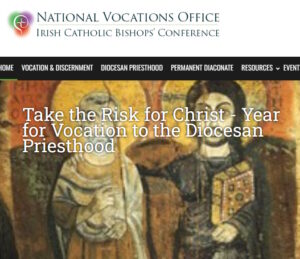“Is God Calling You to be a Diocesan Priest? Come and See. Take the Risk for Christ.” This is what faces you when you click https://vocations.ie/ the website of Ireland’s Catholic “National Vocations Office”.
Asked by Ardal O’Hanlon on his RTE documentary what risk was involved in opting for the celibate priestly vocation today, the National Vocations Coordinator, Fr Willie Purcell, responded:
“Anyone who is presenting himself for priesthood nowadays is really being counter-cultural. It really is a radical decision. The risk really is giving yourself completely to Christ that others might come to know him through you. There really is a lot of humility involved in it, of self-sacrifice involved in it, but most important of all a vocation is a selfless decision, to give yourself to Christ and then to give yourself to others.”
Yet again we are being asked here to ignore what the Gospel clearly tells us about Jesus, viz.:
- That he was never a member of the priestly religious institution of his own time and place;
- That his definitive role in ‘salvation’ was not sacramental or liturgical (i.e. symbolic) but the direct prophetic challenging of a religious system he saw as both exploitative and hypocritical, to the danger of his own life;
- That it was therefore his integrity, not his celibacy, that constitutes the central sacrifice that he did indeed ask us to repeat in memory of him;
- That the definitive Christian calling to ‘follow’ him was therefore NOT to males only to join an exclusively male religious institution but to the same self-giving and integrity in whatever social role we baptised Catholic Christians find ourselves – whatever our gender, age or occupation.
Why does the National Vocations Office see only the risk to clergy?
Why is it not obvious to the Irish National Vocations Office that any social role, in any society, can and does involve these challenges to integrity – and that risk can attach to any of these?
It isn’t only the lives and trials of outstanding Irish individuals such as Veronica Guerin and Maurice McCabe that demonstrate this. Public service, especially for women, has become notably more risky and challenging for anyone who approaches it with integrity in the age of the Internet. With Pope Francis now calling all of us, even teenagers, to ‘mission’ today – and with Irish Garda, nurses, firefighters and paramedics at risk on every callout in certain locales in Ireland – why was this not obvious to whoever dreamt up the slogan ‘Take the risk for Christ’ – implying that the risk of Christian witness attaches solely to the male celibate sacramental calling?
Lessons of the Pandemic
Did not the Pandemic teach us that in an interdependent society the lives of all of us can depend upon those who risk turning up even to man the check-out in the local supermarket or the counter in a dispensary?
Isn’t even any Irish teenager who stands in school against sexual harassment or homophobic bullying – or online trolling of a friend – at risk, and is not this the risk that attaches to the common priesthood of the people of God, the risk that comes to all who affirm their Baptism?
The Priests who spoke out
As for the specific risks that do indeed attach to the sacramental priesthood, how would Fr Purcell account for what happened to those Irish priests who did prophetically challenge the injustices of church policies in relation to women, the LGBT community and the mishandling by bishops of the issue of clerical sexual abuse of children in Ireland, back in 2012?
What a shame that Ardal O’Hanlon did not think to ask if that was indeed the ‘risk’ that the National Vocations Office has in mind!
Child Safeguarding and Risk
And if he had asked that question, would Fr Purcell have recalled that we have never yet had an open conversation on the role and obligation of private conscience when faced with an abuse of authority in the church, as could happen, for example, to any of the child safeguarding personnel we now depend upon?
With synodality far from firmly embedded in our Catholic culture, and canon law still a mess, the risks for every servant of the church that are still posed by the church itself are far from merely notional or historic. Does Ireland’s National Vocations Office truly serve the church by apparently forgetting all of that?
Why in 2024 can we not instead have a properly balanced understanding of ‘vocation’ that does not associate counter-cultural Christian self-sacrifice and ‘humility’ solely with the male celibate sacramental priestly role or imply that for all lay people the risk of Christian witness must be secondary?
Is it not to this clericalist talking-up of the sacramental role alone – and the consequent forgetting of the priestly and prophetic calling of all of us – that we must ascribe the incomprehension of so many young people about the Christian call to themselves?
Baptism the Primary Sacrament of the Priestly People of God
Finally, given the paramount importance of communicating the meaning of our common priesthood, why is the restoration of the primacy of Baptism still lagging totally in Ireland? Is that no concern of the National Vocations Office, or of the Irish Bishops Conference?
In its singular concern for the survival of the sacramental Catholic priesthood in Ireland the Irish National Vocations Office has presented us yet again with an understanding of the Christian vocation that is stridently and essentially clericalist. This can only undermine the central message of synodality and delay the emergence of the co-responsible church we so badly need.
Sean O’Conaill, 17th Jan 2024


An excellent post Sean.
It reminds me of The Men In Black (!) recruitment drive for the archdiocese of Dublin…which didn’t manage to save Clonliffe Seminary from closing, despite the expensive advertising campaign.
More of the old wineskins when the new wine is here…